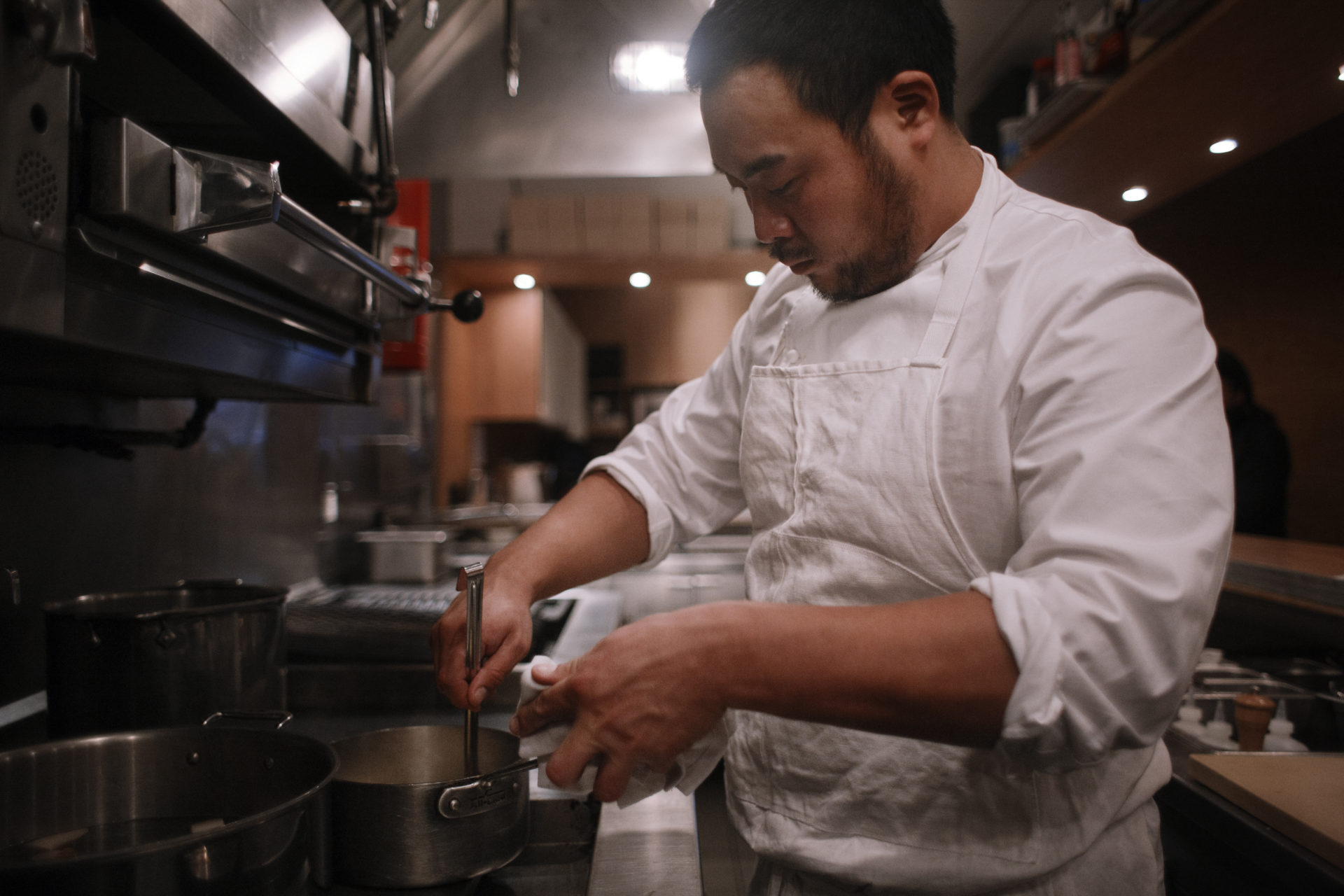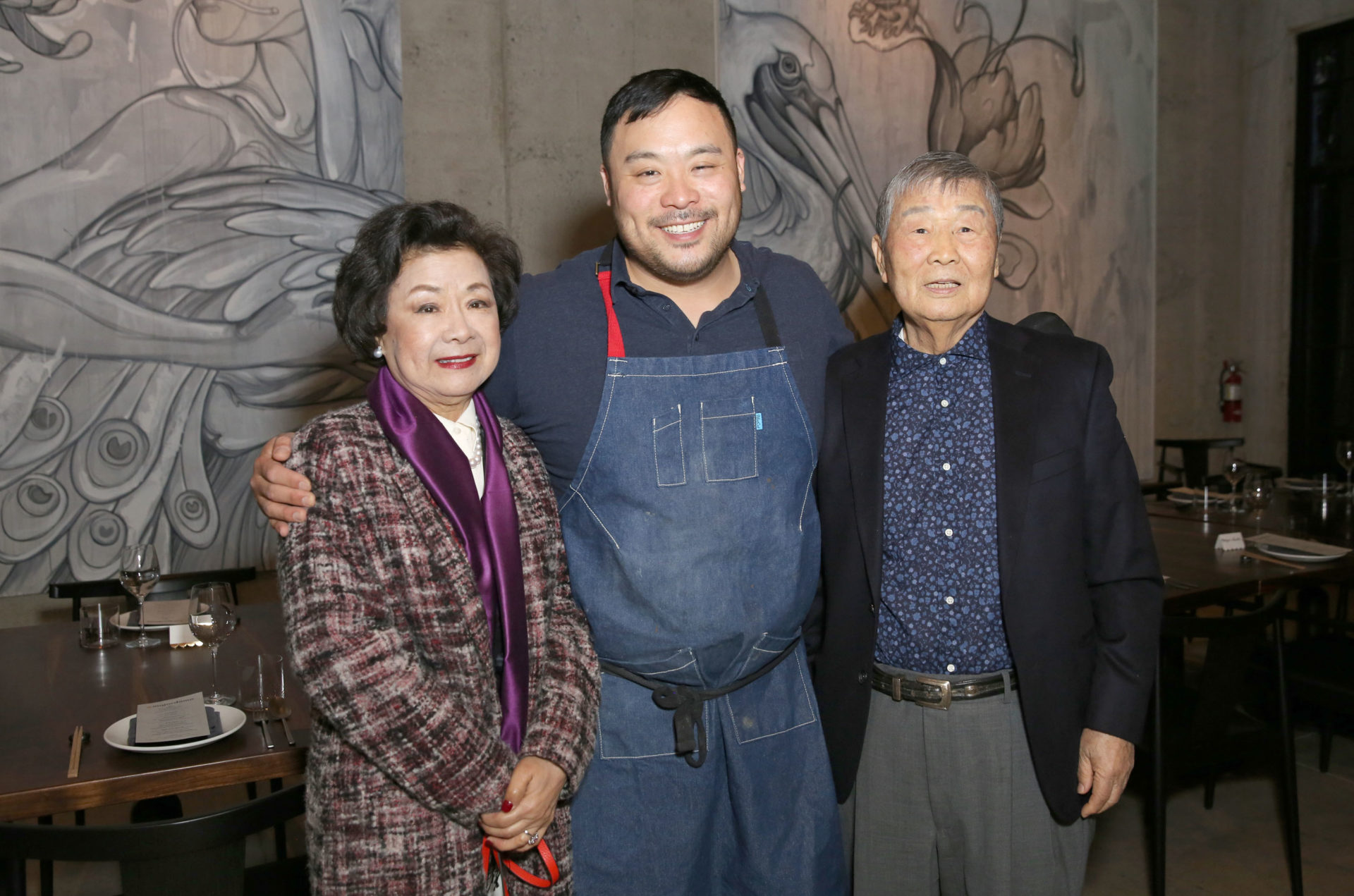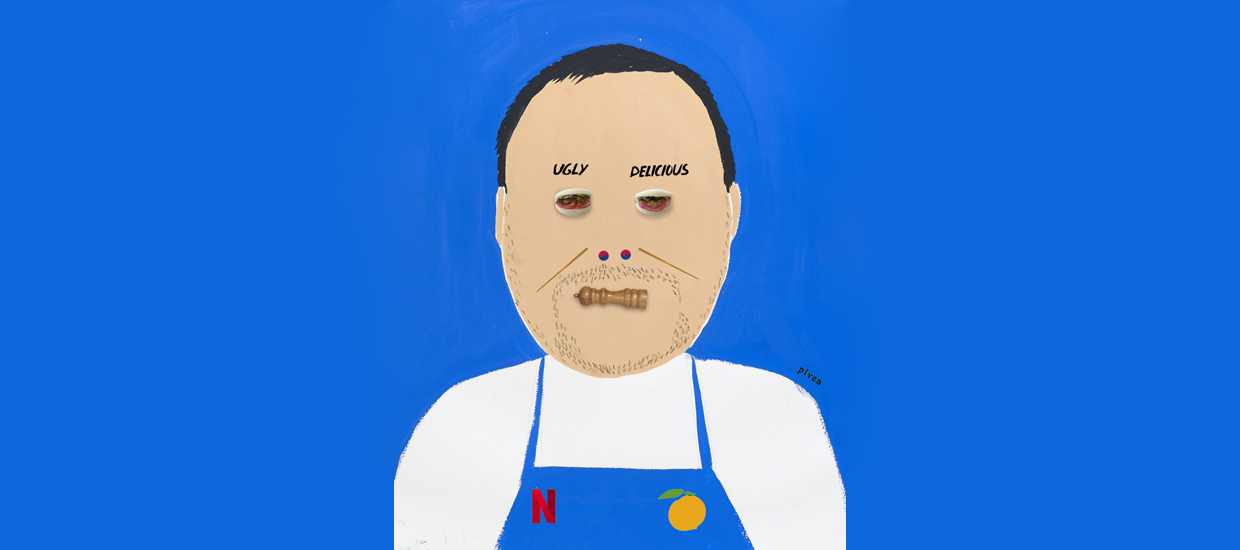Illustration by Hanoch Piven
David Chang was barely a teenager when he first sought the grammar of depression. He rifled through the card catalog at Tysons-Pimmit Library, off Route 7 in Virginia’s Fairfax County, just west of Washington, D.C., hoping to learn more about mental health struggles. His quest bore little fruit. In the pre-computer days, he managed to find only two books that gave shape to his inner life: William Styron’s Darkness Visible and Albert Camus’s The Myth of Sisyphus.
Today, of course, Chang is a world renowned chef whose forward thinking has shaped the past decade’s food trends. As the founder of the Momofuku restaurant empire, which spans three countries, he’s a big reason that boutique ramen bars have popped up in just about every city in America. He foresaw the potential of food-delivery apps and plant-based meats, embracing both technologies just as they were beginning their ascent.
He’s also a media bigwig: a popular podcast host, interviewing chefs and fashion CEOs alike, as well as a producer of food and travel shows for Netflix (and soon Hulu), devouring bao with Ali Wong and eating his way across Marrakech with Chrissy Teigen. In 2018, he even served as a special correspondent during the Winter Olympics in PyeongChang, South Korea.
Shifting priorities
Yet, in some ways, everything that Chang has built in the intervening three decades since that trip to the library has been in response to a missing language in his life. “Momofuku was my identity, and it was born of my depression,” Chang writes in his memoir, Eat a Peach, which comes out September 8. “I wasn’t beating my illness, or even trying to, really. I had subdued it by redirecting its energy into my own productivity.”
The workload isn’t any lighter these days—one might argue it’s heavier than ever—but it’s different. Last year, Chang named Momofuku’s first CEO (Marguerite Mariscal), and welcomed a son, Hugo, with wife Grace Seo Chang. Priorities have dramatically shifted. Two months before the memoir’s original May release date, the COVID-19 pandemic turned the hospitality industry upside down. Millions of restaurant and bar jobs were lost in an instant.
“The need for change was urgent even before any of this happened,” Chang writes in the book’s afterword. “And if you ask me, much of it was already coming—at least as far as the restaurant industry goes; it’s just that the world has condensed that change from a timeline that would have probably been ten to fifteen years down to a matter of months.” The memoir has otherwise been left untouched, to serve as an education of a particular time: “I really believe you can read this book as you would a history text about the excesses of the Roman Empire,” Chang writes.
And so, Eat a Peach paints an unfinished portrait of the man behind Momofuku, still grasping at straws, still processing emotional wounds in both childhood and adulthood, still coming to grips with what he’s built. But talking about his relationship with work, the responsibilities that come with his unprecedented platform, and the idea of conditional love, Chang makes it clear he’s learning to let go, at least a little.

The Hemi Q&A
You’ve cited Sisyphus as a fictional hero of yours. The cover of Eat a Peach shows a man at the foot of a mountain pushing a giant peach, a nod to the myth. What does the story mean to you?
That’s a repeating theme that I wrestle with. It’s garnered a tremendous amount of significance in how I look at life for myself, as to how I move forward. At the end of the day, for me, it was rejecting my default setting. However things happen to be, I think you really only have one option, and that’s to not let it overcome you. Most people think that the drudgery of day-to-day existence—to do the repetition, to do work itself—sucks. In some ways, in 2020, to do something Sisyphean has a terrible connotation to it, and I think one reason is maybe we’re looking at it the wrong way. My own personal take is that maybe happiness is actually pushing the boulder, doing the work. That might be the best part of the whole thing.
In the book, you offer 33 rules for becoming a chef, a riff on New York magazine art critic Jerry Saltz’s essay “How to Become an Artist.” Imagine yourself in your early 20s. Would you have soaked up all of that guidance or rolled your eyes at it?
I probably would have done both. I probably would have said to my friends in the culinary industry after service: “F *** this guy. I can’t believe how stupid this book is.” But then privately I would have read it and been like, Yeah, I think this is pretty right on.
Over the past two decades, you’ve established a platform that is extremely rare for people of color: You’ve been positioned as an authority in a general sense. Quite a compliment, of course, but also a lot of responsibility.
You can blame my dad for me not being able to accept any kind of praise, but I just don’t believe it. It’s just easier to operate my life that way. I try not to think about that title or being in that position, and in some ways, it’s left me unprepared for the responsibility that you just said.
I never really thought about it until the [2018 Winter] Olympics in PyeongChang—that I wasn’t just representing Koreans but Asian Americans and cooks and people of color. And it didn’t honestly hit me until I was about to go on. I’m in the Olympic Village right next to the torch, and I’m about to go on stage to see Mike Tirico to talk about the footage that we had filmed with the haenyeo women divers—the amazing, brilliant women that just do the most impossible things with diving, cooking, and all these beautiful things in our Korean culture, right? It represents the best of Korean culture. And then, doing another [segment] about Korean food. Then literally right before we get to go on, the producer says, “Hey, just so you know”—I don’t know why he did this—“there’s going to be at least 20 million people who are going to watch you.”
No pressure.
I was traveling with [artist David] Choe, and right after that moment, coming off stage, the first thing he said to me was, “Dave, no one that’s Korean would have chosen you to represent Korea. But you’re in this position, so don’t f *** it up.” And that’s really it. It’s just all hitting me now. It’s a responsibility that I never thought that I’d have.
And it’s not just Korea. In some regards, there’s no monolithic Asian culture, but because there is a lack of representation, I have to speak on behalf of Asian culture in some ways. I’m not the voice for everyone, but I’m going to try on my end to talk about food and talk about stories of our people. I have to think about it and be like, I’ve gotta do the best possible job. I have to be well researched. I have to do my homework. Because these opportunities have not been there before.
The responsibility and the privilege run contrary to how you’ve perceived yourself. What keeps you going?
A lot of it was stuff I’ve been wrestling with with my shrink—I don’t know if I’d be here without his help. When we’ve been able to identify things where I’ve been happy and it’s been very positive in life, it’s when I’ve been in genuine service to others. That was one of the reasons why, ultimately, I decided to talk about depression. I can’t talk about it in a way that’s prescriptive, because I don’t want to. But if I just talk about my own struggles, maybe that’s going to be more effective.

In your book, you write, “For me, depression manifests itself as an addiction to work.” But now Momofuku has a CEO; you have a family to take care of. Do you feel as if you’re starting to find a better balance?
The reality is I still work too much, and just last night I was like, I’m not working enough. That’s a real problem I have. But I know that my number one priority, unequivocally, is to have a little bit more clarity, to be present, and to be the best father I can possibly be—far and away over anything else. And that’s a new thing. I’m ridiculously hard on myself, and I don’t know if that will ever stop, but it’s clear to me that—and you hear it as a cliché over and over again—when someone is fortunate enough to have a child, your priorities shift. And I couldn’t be more excited about that.
My problem is work and finding that balance. If I am working too much, then I beat myself up: I’m not home enough, I’m not home enough. What am I doing? I think that in terms of shifting priorities, that was one of the goals. To be home. To be a little bit more present.
You describe the relationship you had with your parents growing up as feeling distinctly conditional. Could you elaborate on that?
One hundred percent. As an Asian American, Danny, you sort of knew what I was talking about, right?
Absolutely.
It’s hard to describe. If you’re not from that household, I don’t know if it’s ever going to make sense, because it sounds like a business contract, but in some ways it is. And especially being from an immigrant household, it’s like, whatever you do, don’t let them down. It’s an obligation and duty that makes it hard when you do make a mistake. Because what you want is love and affection, but you only get love and affection when you do something good.
I’ve seen a psychiatrist for almost 17 years—the same one. It’s only in the past 36 months that we’ve delved into the issues that we first spoke about 17 years ago. Because inevitably, whether you’re seeing a psychotherapist, therapist, or psychiatrist, they’re always going to link something to your parents. And I was always like, That’s not possible, that’s not true. But the reality is, it’s 100 percent true for me.
So how does that feel?
I think that’s the reckoning. You wish you were perfect. We see this in the world today, with social media. We’re grading people in vacuums. We expect people to be perfect in an absolute world. But we don’t live in that world. And I think true freedom, and true freedom of will, is: We’re going to hope that you’re going to make more right decisions than wrong decisions, and when you make a wrong decision, we hope that you’re going to have enough fortitude to learn from that mistake. And to me, more and more, the definition of being present is knowing that. Knowing when to intervene, when not to intervene, and knowing that people are going to make mistakes.
That’s a language and understanding that you’ve been afforded that your parents may not have had access to. [Editor’s note: Chang’s father passed away after this interview was conducted.]
Yes, I can complain all day long about not having parents who spread the love that I desired. But there was all this crosscultural s *** that was impossible to translate. Stuff is just lost in translation. I have to think, like, Man, my dad had it really hard. He was the youngest of nine kids. He grew up in North Korea, on the border of China. There’s no running water, no electricity, no food, war happens. We’re products of nature and nurture, and as much as I want to grade my dad to be perfect, I have to remind myself that that’s just not possible. And it gets me a little bit closer to forgiving him.
The one thing that I do have, and it’s a responsibility afforded to me with the education and the opportunities provided to me, is knowing that I can do a better job. I want to be like a football team that learns from its mistakes, a basketball team that doesn’t repeat the same mistakes from the previous season. I’m trying really hard these days not to have any more excuses but to have accountability, and to have that responsibility to do it a little bit different.
Next up: Dale Earnhardt Jr. looks back on his career




